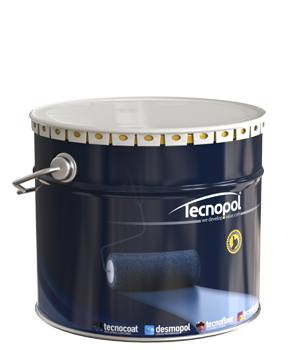GENERAL FEATURES
- It is a one-component, water-based, colored, thixotropic paint that once dry forms an elastic, continuous layer, fully adhered to the support, without joints or overlaps, elastic, pigmented, aliphatic (resistant to UV rays).
- Its consumption depends on the situation of the support, irregularities it presents or level of planimetry.
- It can be applied on inclined surfaces of different types of substrates: concrete, mortar, cement, ceramics, metal, wood.
- The application must be carried out in conditions of no presence of humidity in the substrate or water coming from the substrate or backsplash, either at the time of application or a posteriori (pressure due to water table...). In the case of moisture existing in the substrate at the time of application, consult the technical sheets of our primers where the ranges of resistance to humidity are specified.
- The application must be carried out on firm and dry substrates, at a substrate temperature 3 ºC higher than the dew point, with an ambient temperature higher than 8 ºC and an R.H. less than 80%.
YIELD
The recommended consumption is approximately 1.5 to 2 kg/sqm (0.92 mm) applied in one or several layers, depending on the type of application and nature of the substrates.
PACKAGING
Metal tins in three formats: 6kg, 15 kg and 25 kg.
SHELF LIFE
12 months at temperatures between 5 and 35° C (41 to 95 ºF), provided it is stored in a dry place. Once the tin has been opened, the product must be used.
APPLICATION METHOD
In general, the following factors must be taken into account prior to application:
- previous preparations of the substrate according to its type
- Existing holes or areas with a lack of material must be repaired using a mixture of our Primer EP-1020/Primer EP-1010 epoxy resins.
- joint filling with Mastic PU, polyurethane putty
- in existing work joints: empty old material, clean and fill with Mastic PU. Complement the joints with Tecnoband 100 if necessary.
- general cleaning of the substrate, removing dust, dirt, grease or existing efflorescence
Concrete substrate
- The concrete must be completely cured (the concrete curing process takes 28 days), or in any case, it is necessary to check the maximum degree of substrate moisture permissiveness depending on the primer to be used.
- perform physical processes (substrate preparation (sanding, polishing, shot blasting or milling)) to remove surface slurry, release agents, as well as to open the surface pore and achieve an adequate anchoring profile.
- Existing holes or areas with a lack of material must be repaired using a mixture of our Primer EP-1020/Primer EP-1010 epoxy resins.
- joint filling with Mastic PU polyurethane putty
- in existing work joints: empty old material, clean and fill with Mastic PU. Complement the joints with Tecnoband 100 if necessary.
- cleaning the substrate, removing existing dust, dirt, grease or efflorescence by mechanical aspiration
- primer application Primer PU-1050/Primer PUc-1050 of polyurethane nature with a total yield of approximately 300 g/sqm (applied in several thin layers) or Primer WET depending on the humidity existing in the substrate and with a total consumption of 450 g/sqm. Primer consumption is always subject to the physical characteristics of the substrate and its absorption coefficient.
- open the container and homogenize using mixing equipment at medium speed
- Apply a first layer diluted with water (15%), to increase adhesion in cases of very porous supports.
- apply a first layer, with an approximate consumption of 0.750 kg/sqm, impregnating a fiberglass reinforcement and allowing it to dry.
- apply a second layer with an approximate consumption of 0.750~1 kg/sqm. The final consumption should be approx. 2 kg/sqm
NOTE: For other types of substrates, weather conditions or the substrate to be applied, consult our technical department.
HEALTH AND SAFETY
These safety recommendations for handling, are necessary for the implementation process as well as in the pre and post, on exposure to the loading machinery.
- Respiratory Protection: When handling or spraying use an air-purifying respirator.
- Skin protection: Use rubber gloves, remove immediately after contamination. Wear clean body-covering. Wash thoroughly with soap and water after work and before eating, drinking, or smoking.
- Eye / Face: Wear safety goggles to prevent splashing and exposure to particles in the air.
- Waste: Waste generation should be avoided or minimized.
- Incinerate under controlled conditions in accordance with local laws and national regulations.
- Re-occupancy of the work site without respiratory equipment is minimum 24 hours providing the correct ventilation for the area sprayed.
- Contractors and applicators must comply with all applicable and appropriate guidelines for storage and safety guidelines.
Consult the material and safety data sheet of the products of the system for further information
TECHNICAL AND CHEMICAL PROPERTIES
|
PROPERTIES
|
VALUES
|
|
Density ISO 1675
|
1.40 ± 0.05 g/cm³
|
|
Viscosity ISO 2555
|
27,000 ~ 35,000 cps
|
|
Solid contents
|
65~75%
|
| VOC(volatile organic compounds) |
0 |
|
Elongation ISO 527-3
|
>200%
|
|
Tensile strength ISO 527-3
|
>0.5 MPa
|
| Tack free time |
2~4 hours |
|
Temperature resistance service
|
-20~90 ºC (-4 to 194ºF)
|
|
Application temperature
|
5~45 ºC (41 to 113ªF)
|
Results were performed in the laboratory at 23ºC (73ºF) and 50% RH, under controllable conditions. These values may vary depending on the application, climatology, or substrate conditions.











